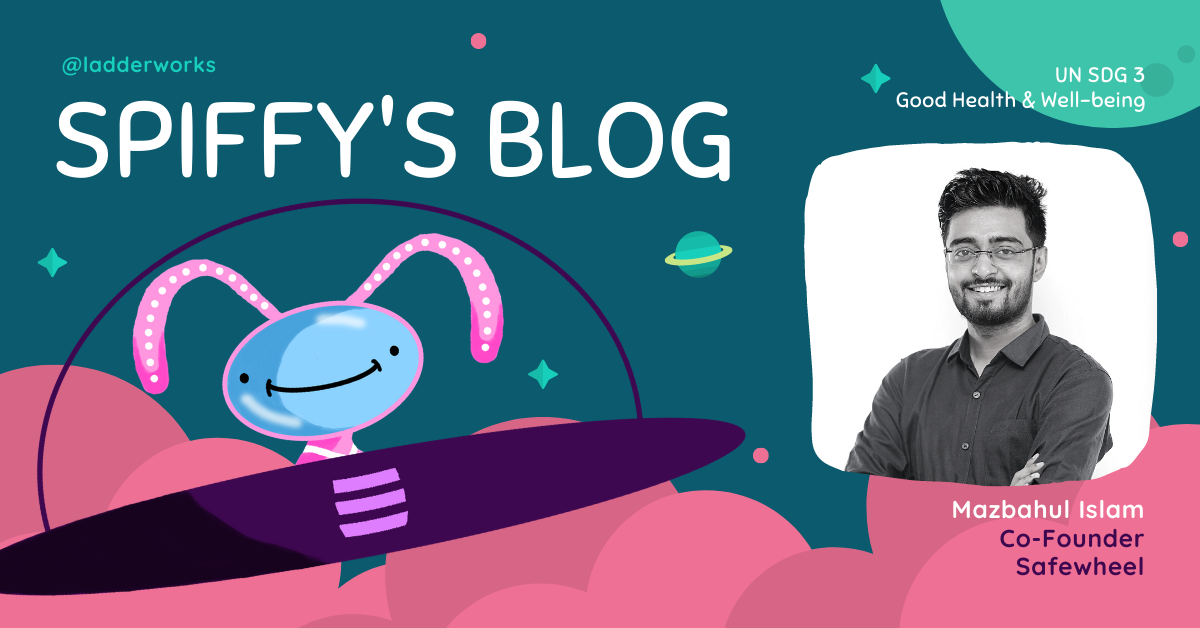Mazbahul Islam: Meeting Rural Bangladeshis Where They Are, With an Ambulance
 Hi there, I’m Ladderworks’ interplanetary journalist, Spiffy. One of my sources gave me a tip about an awesome social entrepreneur here on Planet Earth named Mazbahul Islam who’s working on UN SDG 3: Good Health and Wellbeing with his company Safewheel, in Bangladesh. Let’s go meet him!
Hi there, I’m Ladderworks’ interplanetary journalist, Spiffy. One of my sources gave me a tip about an awesome social entrepreneur here on Planet Earth named Mazbahul Islam who’s working on UN SDG 3: Good Health and Wellbeing with his company Safewheel, in Bangladesh. Let’s go meet him!
Spiffy: Thanks for joining me Mazbahul! I hear you’re doing some amazing work with ambulances – what challenge are you addressing?
Mazbahul: Thanks, Spiffy, you nailed it. In Bangladesh, 105 million people are residing in 68,000 villages. In those 68,000 villages, only 1,200 ambulances are available for the 105 million people. That being the case, there is only 1 ambulance obtainable for 88,000 people. As a further scenario, among those 1,200 ambulances, below 7% of them have paramedics to assist the patient in time of emergency. It is even uncertain whether those ambulances, regardless of having a paramedic or not, operate properly or not.
 A Safewheel Ambulance with Mazbahul’s two other co-founders Faysal Islam (left) and Anas Hossain Makki (right). (Image courtesy of Mazbahul Islam)
A Safewheel Ambulance with Mazbahul’s two other co-founders Faysal Islam (left) and Anas Hossain Makki (right). (Image courtesy of Mazbahul Islam)
Spiffy: What motivated you to work on this?
Mazbahul: Dying due to the lack of emergency medical help is something that these rural people are used to. And this is why I have committed my life to dedicate myself to the rural communities. The more I learn about their stories, the more passionate and motivated I become to fight for their rights. Currently, with Safewheel, I am engaging myself to work on these issues. We are launching tricycle ambulances to the rural communities so that they can easily get an ambulance when they need one.
Spiffy: Wow! I’ve never seen tricycle ambulances on Earth before. How is Safewheel making the world a more equitable place?
Mazbahul: Living in the same country when I see the people in the cities are more concerned about their food delivery taking more time than expected, the rural people fight between life and death because the ambulance they called for is taking more than an hour to reach there. Through Safewheel, we are working towards making emergency healthcare accessible to all regardless of where you live. Emergency healthcare can not be a right only for the rich people. It should be a right equally for all. That is why at Safewheel, we are focusing on affordability and accessibility of emergency medical treatment and transportation dedicated towards the last mile of the country.
Spiffy: What milestones have you reached with Safewheel recently?
Mazbahul: Recently, we have launched Safewheel ambulances to a new region covering 150 villages. This ensured accessible and affordable emergency medical transportations to thousands of families. We have also very recently conceptualized the introduction of telemedicine services from Safewheel which will make a national effort in taking on-demand professional medical guidance to the last mile of the country.
Spiffy: What was a time you faced failure and overcame it?
Mazbahul: During the launch of Safewheel, it became challenging to adapt to a new community to build trust among the people. Many villagers did not want to adapt to a new thing and some strictly pushed our offering back. As a team, it was giving us a doubt whether we are doing the right thing or not. At that very moment, I realized that I was not considering the little successes in the face of a big challenge. I needed to hold on to the villages that let us in—not the ones who did not. I learned that sometimes we do not put an effort to look at the positive side when we face challenges. And as long as we only count the failures, we will never find the drive to reverse them.
Spiffy: What’s something that you’ve learned recently from an unexpected source?
Mazbahul: Well, I did learn something very important from a movie I recently watched. And yes, it unexpectedly became a creed. I was watching this movie called "Bill & Ted" where the two guys said, "Let's be excellent to each other." And there you go! When I really thought about it, it started to grow on me and I learned to become empathetic to others, especially when they are going through something. Sometimes, it is the most important to listen. Not just to listen but to listen actively. And as my work lets me interact with people from underserved communities, this was something invaluable I learned. Listening and being excellent to my community and its people. This is a great way of showing you can blend in.
Spiffy: Mazbahul! You’re truly learning from all around you, it’s been an honor speaking with you.
Mazbahul Islam is an impact-driven entrepreneur and a business graduate from Bangladesh. He is one of the co-founders of Safewheel and currently working at YY Ventures as a program manager, a social business company backed by Yunus Centre and guided by Nobel Laureate Professor Muhammad Yunus. (Nominated by One Young World. First published on the Ladderworks website on July 14, 2021.)
© 2021 Ladderworks LLC. Edited by Elias Ross Trupin. Spiffy’s illustration by Shreyas Navare. Follow Spiffy’s interviews of founders building a more equitable world here.


